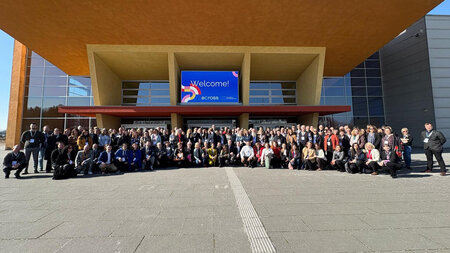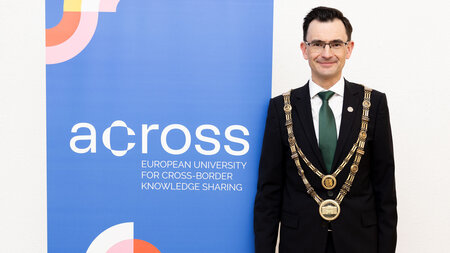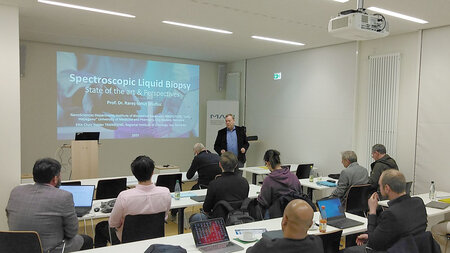Multifunctional Molecules in the International Focus
Scientists from four AC21-member universities have come together at Chemnitz in order to discuss opportunities for future-oriented application of results in porphyrin and pythalocyanine research
-

Scientists from Germany, Thailand, France and the US came to Chemnitz and took part in the workshop. Photo: TU Chemnitz -

Prof. Dr. Patchanita Thamyongkit (Chulalongkorn University), Prof. Dr. Michael Hanack (University of Tübingen) and Dr. Jacek Gasiorowski (TU Chemnitz). Photo: TU Chemnitz
Nature teaches us a variety of application opportunities for porphyrin molecules within photosynthesis or human metabolism. The aesthetics of this molecular class consists on the flexibility of the synthesis of different porphyrin derivatives. The ligands as well as the central metal ions may be varied; thus, one may vary the characteristics of molecules in a targeted manner according to the envisaged application. These fascinating characteristics apply also for another related molecular class – the phthalocyanines – and are of interest for scientists all over the world since decades.
From 22 to 23 October 2015, the workshop "Future perspectives on applications of porphyrin and phthalocyanine derivatives" happened at TU Chemnitz. The objective of this event consisted on providing an overview on the current research and on innovative prospective application opportunities of porphyrin and phthalocyanine molecules, the holder of the Professorship of Semiconductor Physics and organizer of the workshop, Prof. Dr. Dietrich Zahn, explained. Fascinated by this idea in the same manner were three other groups of researchers from member universities of the international network “Academic Consortium for the 21st Century” (AC21): North Carolina State University (USA), Chulalongkorn University (Thailand) and University of Strasbourg (France) which have contributed to the successful application for funding the workshop within the “Special Project Fund” of AC21. Also invited scientists from universities and other research institutions beyond the network (Imperial College London, Johannes Kepler University of Linz, University of Tübingen, TU Bergakademie Freiberg, Leibniz Institute for Solid State and Materials Research Dresden as well as Klinikum Chemnitz) were strongly interested in this current and future-oriented research topic. In his welcome address, the Vice-Rector for Knowledge and Technology Transfer of TU Chemnitz, Prof. Dr. Andreas Schubert, emphasized the importance of this workshop for the further enhancement of the international network of TU Chemnitz but also for its scientific reputation. The Chancellor of TU Chemnitz, Eberhard Alles – who is at the same time member of the Steering Committee of the network, where TU Chemnitz counted among the founding members in 2002 – considers the successful implementation of this workshop as another proof for the capability of TU Chemnitz to comply to its self-defined objective to play the role of a key driver for the further development of AC21. Additionally, he regards the workshop as a promising prelude for the AC21 International Forum hosted by TU Chemnitz next year. The preparations for this upcoming conference, for which more than 150 delegates from AC21 member universities and beyond are expected, are operating at full capacity.
The participants of the workshop were particularly delighted of the presence of a pioneer on the field of porphyrin and phthaloyanine research: in his opening speech, Prof. Dr. Michael Hanack (University of Tübingen) provided an insight regarding the greatest achievements on the phthaloyanine research related to electronic applications but also to exceptional non-linear optical characteristics for optical and optoelectronic applications. Further future-oriented application areas of phthaloyanine and porphyrin molecules were presented by other invited speakers and within a poster session. For instance, the importance of porphyrins for the natural photosynthesis and actual endeavors to synthesize novel porphyrin-based molecules for artificial photosynthesis within the production of solar combustibles were mentioned. Furthermore, opportunities to vary molecules of that kind in a targeted manner in order to use them as active media for the decomposition of carbon dioxide, for spintronic components or even as quantum computer were discussed.
The vivid discourses during the lectures, the poster session and the conference dinner have proven that young but also experiences scientists from different subject areas who normally do not meet each other on scientific conferences, have enjoyed the trans-disciplinarity of the workshop.
In conclusion, the local organizers, Prof. Dr. Dietrich Zahn, Prof. Dr. Georgeta Salvan and Dr. Jacek Gasiorowski, agree on the impression that the workshop, funded by the successful application of the Professorship of Semiconductor Physics of TU Chemnitz within a call for proposals of the “AC21 Special Project Fund”, was a great success – and that it motivates for further joint projects: Prof. Dr. Mario Ruben from the University of Strasbourg (France) envisages already the organization of a subsequent AC21-workshop next year at Strasbourg – including the intensive involvement of scientists from Chemnitz.
(Author: Prof. Dr. Georgeta Salvan)
Katharina Thehos
28.10.2015





